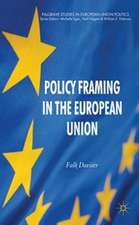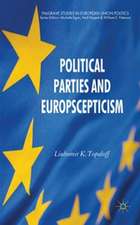The EU's Lisbon Treaty: Institutional Choices and Implementation
Editat de Finn Laursenen Limba Engleză Hardback – 28 feb 2012
| Toate formatele și edițiile | Preț | Express |
|---|---|---|
| Paperback (1) | 338.33 lei 6-8 săpt. | |
| Taylor & Francis – 28 noi 2016 | 338.33 lei 6-8 săpt. | |
| Hardback (1) | 825.62 lei 6-8 săpt. | |
| Taylor & Francis – 28 feb 2012 | 825.62 lei 6-8 săpt. |
Preț: 825.62 lei
Preț vechi: 1143.82 lei
-28% Nou
Puncte Express: 1238
Preț estimativ în valută:
158.00€ • 164.35$ • 130.44£
158.00€ • 164.35$ • 130.44£
Carte tipărită la comandă
Livrare economică 14-28 aprilie
Preluare comenzi: 021 569.72.76
Specificații
ISBN-13: 9781409434627
ISBN-10: 1409434621
Pagini: 328
Dimensiuni: 156 x 234 x 27 mm
Greutate: 0.77 kg
Ediția:1
Editura: Taylor & Francis
Colecția Routledge
Locul publicării:Oxford, United Kingdom
ISBN-10: 1409434621
Pagini: 328
Dimensiuni: 156 x 234 x 27 mm
Greutate: 0.77 kg
Ediția:1
Editura: Taylor & Francis
Colecția Routledge
Locul publicării:Oxford, United Kingdom
Cuprins
Contents: Preface; Part I Introduction: The Lisbon Treaty: overview of institutional choices and beginning implementation, Finn Laursen. Part II Basic Institutional Choices: The 'paradox of Lisbon': supranationalism-intergovernmentalism as an administrative concept, Adriaan Schout and Sarah Wolff; The EU's common foreign and security policy (CFSP) after the Lisbon Treaty: supranational revolution or adherence to intergovernmental pattern?, Kerstin Radtke; The new EU's internal security architecture: implementation challenges, Sarah Wolff; The economy of the Treaty of Lisbon, Ferran Brunet. Part III Institutional Actors: The winner takes it all? The implications of the Lisbon Treaty for the EP's legislative role in co-decision, Rik de Ruiter and Christine Neuhold; Institutional innovation in the EU: the 'permanent' presidency of the European Council, Carlos Closa; From an assistant to a manager - the high representative for foreign affairs and security policy after the Treaty of Lisbon, Carolin Rüger; The European external action service (EEAS): the idea and its implementation, Finn Laursen. Part IV External Action: The common commercial policy: from Nice to Lisbon, Ann Niemann; Preserving policy autonomy: EU development cooperation from Maastricht to Lisbon, Maurizio Carbone; Lisbon and EPAs: what prospects for regional development in Africa and the Caribbean?, Timothy M. Shaw; A Gordian Knot or not? EU representation in UN climate negotiations, Piotr Maciej Kaczynski. Part V Conclusions: The Lisbon Treaty: how significant?, Finn Laursen; Index.
Notă biografică
Finn Laursen, Canada Research Chair of EU Studies, Professor of Political Science, Dalhousie University, Halifax, Nova Scotia, Canada also director of EU Centre of Excellence, Dalhousie University, and Ad Personam Jean Monnet Chair
Recenzii
'Theoretically brilliant and empirically strong. A multifaceted and detailed account of the changes introduced in the political framework of the EU by the Lisbon Treaty. Contrasting different perspectives on the hottest issues faced by the EU in the 2010s, such as the financial crisis, and less known fundamental issues of EU internal and external policies and politics.' Jacques Ziller, University of Pavia, Italy, European University Institute and Sorbonne University, France 'This book provides us with an exceptional insight to the Lisbon treaty and its institutional changes. The significance of the Lisbon treaty is thoughtfully examined, and offers a unique understanding of the achievements and failures of the treaty. This remarkable book offers a critical view of the treaty and contributes valuable analysis to the reader. Laursen has again produced the standard work on a new EU treaty.' Kjell A. Eliassen, Norwegian School of Business - BI, Norway. 'This study provides us with an in-depth and systematic analysis of the institutional choices of the Lisbon Treaty. Combining an account of the Treaty changes with a first investigation into their implementation, it provides highly valuable insights not only for scholars but also for practitioners dealing with the EU institutions.' Sophie Vanhoonacker, Maastricht University, The Netherlands
Descriere
This book gathers leading international scholars to examine the institutional choices and innovations of the Lisbon Treaty and discuss the likely effects of the changes that it set out to accomplish. Will the changes meet the declared goals of a more efficient and democratic Union which will allow the EU to act internationally with greater coherence and efficiency? If institutions matter, how much do they matter? How significant is the Lisbon Treaty? What kind of leadership will be available in the post-Lisbon EU?














